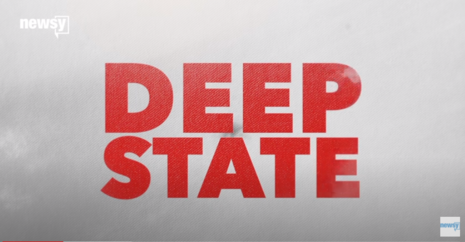
Times technology reporter Davey Alba filed the latest move in the Times two-step for Thursday’s edition: “Barr Is Not Part of a Secret Anti-Trump Plot. In Fact, There Is No Secret Anti-Trump Plot.”
Not long after Attorney General William P. Barr said on Tuesday that the Justice Department had found no evidence of widespread voter fraud in the election last month, the pro-Trump media world began circulating a falsehood about him. In this telling, Mr. Barr had been part of a plot by a secret cabal of elites against President Trump all along.
The most prominent right-wing personality who spread the baseless narrative was the Fox Business host Lou Dobbs. In his nightly show monologue on Tuesday, Mr. Dobbs said that Mr. Barr must be “either a liar or a fool or both” and suggested that he was “perhaps compromised.” Mr. Dobbs added that Mr. Barr “appeared to join in with the radical Dems and the deep state and the resistance.”
Deep state? What deep state?
David Rohde, a New Yorker writer and former Times reporter who wrote the book “In Deep: The F.B.I., the C.I.A., and the Truth About America’s Deep State,” added that Mr. Barr could not be involved with a cabal of elites because “in fact, there is no deep state plot.” He said the term “deep state,” which is shorthand for the conspiracy theory about Democratic elites secretly exercising political control over the public, has been co-opted and vulgarized by many in the pro-Trump universe.
Alba refuted some comments that aired on conservative television networks, then denigrated a journalistic rival, The Washington Times, demoting it to a “far right website.” She conveniently lumped the paper in with two other sites in a mélange of alleged misstatements.
The Gateway Pundit, the Right Scoop and The Washington Times, which are far right websites, also piled on. In various articles, the sites said: “Barr’s masquerade as someone opposed to the criminality of the Deep State” was “a venal lie,” and claimed, without evidence, that the “DOJ is reluctant to investigate election fraud.”
It’s not the first time the paper has insulted a rival to its ideological right (a space that grows wider every year), notably its city rival the New York Post.
It’s also not the first time Alba has smeared right-wing media. By contrast, she has come to the defense of the left-wing rioters of Antifa.
The Times has embraced the “deep state” before, also after hypocritically denying that it even existed. One prominent example was the paper’s pathetic hyping of the Trump-fighting “Anonymous” op-ed, with the paper later caught lying about the author’s prominence within the administration, in order to attract unwarranted attention.
Alba’s smug premise was even unwittingly contradicted in the same edition in a column by Frank Bruni, “The Deep State Is on a Roll.” (Would that be the same “deep state” that Times reporters in different contexts say doesn’t exist?)
President Trump was right about the “deep state” -- sort of. There exist, in government, people and forces rigged to foil disruption.
But the deep state isn’t, as he suggested, a reflexive defense of a corrupt status quo. It’s a righteous defense against the corruption of democracy, which he continues to attempt.
And that defense is holding. Three cheers for the deep state, which has been on a roll these past three weeks.
Bruni puts a bright face on the deep state.
“Deep state” isn’t the right term -- its overtone is too clandestine, its undertone too nefarious — but let’s go with it, co-opt it, turn a put-down into a point of honor, the way gay rights activists did with “queer” and anti-Trump feminists did with “nasty woman.”
Let’s define it ourselves, not as a swampy society of self-preserving bureaucrats in Washington but as a steadfast, tradition-minded legion of public officials and civil servants all over the country, in every branch of government.
These officials and servants are distinguished by a professionalism that survives and edges out their partisan bearings, by an understanding that the codes of conduct and rules of engagement become more important, not less, when passions run hot. They’re incorrigible that way. Invaluable, too.





